Looking for Max Bunshaft
and other memoir pieces that reveal a tumultuous life
My mother smoked Chesterfield Kings and drank a Bloody Mary when she got home from work each night. She liked Kurt Vonnegut, Cary Grant and Anthony Quinn. She was a screamer, both as a parent, and when she and my dad were locked behind their bedroom door. Later, when the cancer had devoured her spine, a car ride became a torture chamber and she would respond to each pothole and bump by shrieking in agony. She suffered from migraines and hay fever and thought her breasts were too large.
I was too young and selfish to consider which questions I would later wish I had answers to. Like, how she got that strange bruise on the white part of her left eye, and did it have anything to do with why her mother, Sophie, was committed to a mental institution when my mother was just sixteen years old?
Would the box outside my front door contain any clues? With trepidation and curiosity, I opened the musty smelling package my brother had sent promising a surprise. I wondered if its contents contained toxic mold capable of infecting me if I inhaled the surrounding air. Inside, I found the small hard cover book, 20,000 Commonly Misspelled Words my mom kept beside the IBM typewriter she’d use to type my father’s manuscripts. Underneath some vaguely familiar books from my teenage years, was a yearbook covered in yellowed and ripped protective plastic from Westside High School, Class of 1949.
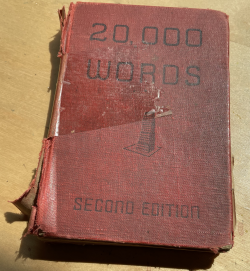
I could feel my heart palpitating as I pulled out the book and placed it on the dining room table. When I saw the lavender ribbon from her prom corsage tucked inside the front cover, I knew it belonged to my mother. I didn’t remember ever seeing the yearbook before, although I might have been too young to care.
I flipped to the section containing senior photos and immediately spotted my mother, but was surprised to find Ann Volkenheim had been nicknamed, “Raggedy Ann.” She was a member of the Commercial Club, the National Honor Society, the Interpretive Reading Club, the Ty-Pin Club, and the Yearbook Features Committee. “Raggedy Ann” loved to Rhumba, was known for her “everlasting giggle,” her loud sneezes, and “could often be spotted dancing at the Y.” I scoured all the club pictures; finding no evidence my mother earned her nickname because she wore shabby clothes. Since her mother, Sophie, was confined to Essex County Hospital Center, did my mother suffer the loss of a maternal influence, someone who might have helped her discover and exploit her most flattering assets? Or, did stumped yearbook editors simply invent “Raggedy Ann” on the spot?
Flipping through the yearbook, I wondered if anyone who’d written, “Best of luck to a swell girl,” had actually known my mother. Several girl’s notes indicated they’d known Ann Volkenheim longer than four years of high school, and I wondered how I might contact them if they were still alive. I got to the last page of the yearbook where a dozen people had written notes, including one Max A. Bunshaft:
Dear Ann,
I wonder if you still remember that night!
What say?
Max A. Bunshaft
(“A” is for Allen)
Who was Max Bunshaft? There was no trace of him among the senior portraits. Was he an older guy? I smiled at the thought of my teenage mom engaging in a memorable night of promiscuity. There had to be more about Max Bunshaft –somewhere. I started to close the yearbook when a stack of papers tucked between the final page and back cover caught my eye.
In that pile, I found a commencement program, some newspaper clippings, two identical souvenir photos from prom night, and a tiny pencil attached by a green string to a small card folded in half. It had the letters WS HS along with the date of her prom, Tuesday, June 14, 1949 printed on it. Inside were the names of chaperones and the menu including an appetizer of hearts of celery on ice, and an entrée of turkey with potatoes and vegetables. The middle two pages, labeled “Dance Program,” were filled with sixteen numbered lines. It was her dance card! On the first page, the same Max A. Bunshaft who’d written in my mother’s yearbook had signed seven of the eight lines. The last line, written in my mother’s unmistakable handwriting, held the crossed-out name, Herb Baron. The second page was identical to the first. Max Bunshaft had fourteen scheduled dances with my mother on prom night. In the prom photo, a young man dressed in black pants, a white tux shirt, black bowtie and white jacket stood slightly to the right and behind my mother with his arms wrapped around her, holding her hand. As a couple, they looked radiant. Was that Max Bunshaft?
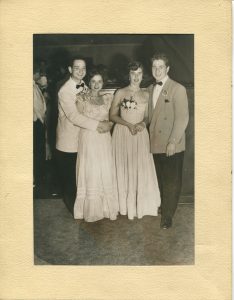
I also found a handwritten note from my mother to “Mr. Heel,” which had been ripped from a steno notebook dated June 13, 1949, a day before the prom.
It said, “I was surprised (to say the least) at your pleasant behavior in regard to the little matter of a formal prom which I never attended. To be truthful I thought you were at least trustworthy, if not honest. Well, we all make mistakes, but this has been my worst so far. “
I felt like I was witnessing her high school drama unfolding before me.
I checked the yearbook with no sign of Mr. Heel. Was he Herb Baron, the boy whose name was crossed off her dance card? Did Max Bunshaft rescue Raggedy Ann at the last minute and take her to her senior prom? Why was this note tucked away in her yearbook?
I scoured the pile again and a found a souvenir dance program from a performance featuring Ralph Flanagan and the Chesterfield Orchestra. The back page offered these words of wisdom from Ralph himself:
“Be your own expert and you’ll always buy Chesterfield, the cigarette that smells milder and smokes milder.”
Was this the night Max Bunshaft referenced? Was this the night my mother started smoking Chesterfield Kings? Did my brothers look at all this stuff before they sent it? Or, was her yearbook only of interest to a daughter in search of clues about her mother.
I unfolded the larger newspaper clipping and discovered a list of the graduates of West Side High. The smaller one was a wedding announcement, the kind door-to-door Cutco knife salesman use to identify prospective customers. It read, “Eleanor Marcus Is Newark Bride. She and Max Bunshaft Are Wed at Steiner’s.”
.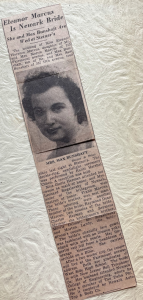
Was my mother a stalker?
Grief stricken at fourteen, it had never occurred to me to try and find people who knew my mother when she was a teenager. As the years passed, the desire to “know” my mother grew stronger, and though I would ask family, friends, and acquaintances if they could recall memories of her, strangely, not even her “best friends” could remember anything. My father, with his dwindling, drug-abused memory also failed to give me what I wished so desperately for. Ironically, he called out of the blue one day, and said, “I’d like to interview you about your mother.”
All I could say was, “I thought it was supposed to be the other way around.”
If they had survived, my mother and her classmates would be seventy-five years old.
Could Max Bunshaft be alive?
I Googled him and the search results shocked me. Max Bunshaft was a stamp collector from Newark, New Jersey with an address less than two miles from where I lived in Van Nuys, California.
It was too late to call. I slept as if I’d just won the lottery, with one eye open clutching my precious ticket.
***
“Max Bunshaft lives within walking distance of my house!”
“No kidding, “ my brother said after I told him the story.
“I can’t wait to call him!” I said.
But wait I did. At ten a.m., I got a woman’s voice on an answering machine and left a message mentioning my mother’s name and my number. I called later that afternoon, and again in the evening. I did this compulsively for almost two weeks, but only got the machine. I didn’t leave more messages. I didn’t want him to think I was a stalker.
My first reaction was that he must be dead; the sick punch line to a cosmic joke. After all these years, I finally get the yearbook only to have missed Max Bunshaft by a week.
My catastrophic thinking was a pathology caused by early mother loss. I always went from A straight to death. If I didn’t get an expected phone call, a heart attack was to blame. If I got a phone call late at night or in the wee hours of the morning, then somebody’d been hit by a truck. I was the greatest risk to myself when my mind played in this dangerous playground.
While obsessing about the fictional end of Max Bunshaft, I became enraged. I’d waited thirty-four years during which time, memories, like pictures, had probably faded. I didn’t know what would be worse –faded memories, or a yearbook filled with dead people.
Josephine Tozzi, who’d written, “To Ann, I’ve known you straight thru school and I’ll always remember you. Good Luck and success to a sweet girl. Forget me not,” was probably married long ago. How would I be able to Google her, or my mother’s other girlfriends, without knowing their married surnames?
I had to remind myself that Google didn’t exist in 1972, and without it I wouldn’t have found Max Bunshaft. I Googled his name again hoping to find some overlooked detail, and found that in addition to being a stamp collector, he was also president of the Valley Beth Israel Men’s Club.
Mr. Bunshaft’s medical prognosis improved immediately! Instead of going from “A to dead,” I decided Max must be touring Israel with his Men’s group. I’d left the playground of catastrophe and headed straight for Classmates.com.
They’d been hounding me to become a paid member for at least five years. In search of a bargain, I joined under my mother’s name thinking I could access my own high school community and get a two-for-one deal. They even asked for the last names my mother (and I) would have been known by, while we were students.
After writing a dozen individual emails, I posted an announcement next to my mother’s name, so anyone scanning the list would see it. Then I searched the entire roster for Max Bunshaft and discovered he’d graduated from Westside two years earlier. He was an older guy… and he still hadn’t returned my call!
Three weeks after my first attempt, I phoned him again, and a man picked up the phone.
“Hello,” he said.
“Hi, I’m looking for Max Bunshaft.”
“This is Max Bunshaft.”
“My name is Brett. I left a message on your machine a couple of weeks ago.”
“Oh, my wife said something about that. I was in Las Vegas.”
“ Did you win?” I asked, trying to be conversational rather than nosy.
“No, I was just visiting my money,” he said.
“Before I take up any more of your time, may I ask if you went to Westside High in Newark, New Jersey?”
“Yes, I did,”
“Well, I know this might sound crazy but I believe you took my mother to her senior prom in 1949. Do you remember Ann Volkenheim?” He paused. The silence was deadly.
“No, I can’t say I do.”
“Well, I have this yearbook and there’s a note from you on the back page, plus a dance card with your name all over it.
“I went to a lot of proms,” he said. What? I’d never heard of such a thing. I never even went to one prom. Was he afraid to talk? Was his wife listening to his conversation?
“I have a photograph of my mother, her date, and another couple from prom night. I was hoping you would help solve this little mystery. Is there a chance we could meet and I could show you these things?”
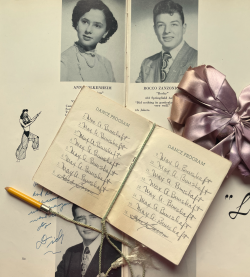
“Maybe”
Maybe? I wondered.
“You’re not going to believe this – I can hardly believe it myself– but you live really close to me.”
“Well maybe I’ll call you sometime.”
Sometime? I could feel myself heading back to the catastrophe playground. Did this guy think he was going to live forever?
“Well, please call anytime.” I gave him my home and cell numbers and said goodbye.
What if he didn’t remember my mother? No, I’d probably just caught him off-guard. After all, I could be a con woman preying on an elderly man. Of course he was suspicious. Maybe I should visit the Rabbi of Valley Beth Israel. He would understand my wanting to talk with Max Bunshaft. Perhaps he would convince Max to talk to me.
I was painfully aware of the unrealistic expectations I had riding on this old man. It was another personality defect I’d acquired while watching my mother’s health deteriorate. My emotional needs at that time were ignored. I was witnessing my mother’s slow death, and didn’t know it. In addition to maintaining family secrecy about my parent’s illicit drug use and my father’s association with prominent contemporary artists and musicians, I was required to cook, clean, and run the “family show,” while performing in school at nothing less than a level of excellence. When I proudly handed my mother my report card with straight A’s, she replied, “You’re so boring.”
It didn’t occur to me that other kids weren’t growing up under the same performance pressure. My expectations of others became completely distorted. My hopes about Max Bunshaft were already raging out of control. If Max Bunshaft didn’t remember my mother, surely her pictures would jar his memory.
I kept returning to the yearbook, hoping it would shed light on some detail I’d missed, some person who could help me. That’s when I got an email from Olga DiBlasi, class of ’49:
Dearest Brett,
I wish I could tell you more. I remember Ann as a quiet and serious student. Never understood her nickname of “Raggedy Ann.” I’m sorry to hear of both your parents passing. Ann was very young…
We were all so starry-eyed and oh so innocent those days. We were heading into the fifties, the golden years. We knew nothing of child molestation, terrorists, illegal immigrants, Nigerian scams, crooked politicians, etc. We did not have computers, cell phones, i‑pods or vacuum cleaners that moved by themselves! We were deliriously happy with the world the way it was and eagerly awaited our destinies. Was it a better world? I don’t really know. What I do know is that your Mom and I and countless others looked forward to our futures knowing nothing could stop us! Sincerely, Olga Di Blasi
I wept. Olga’s words helped me understand my mother’s world. I looked at the photos of Raggedy Ann and saw the glimmer of hope in her youthful eyes in spite of what I could only guess was her hardship at home. I saw my mother’s innocence and beauty. I longed to know her.
Meanwhile, I was certain Max Bunshaft and I were shopping at the same supermarket. He probably frequented our favorite Thai restaurant around the corner, too. I considered making a t‑shirt, emblazoned with the words, “Looking for Max Bunshaft,” which I could wear whenever I had to run an errand. Instead, I called him again.
“Hi, it’s me, Brett Aronowitz.”
“Who?”
“The daughter of the woman you took to the prom in 1949.”
“Oh yes, I was thinking of calling you.”
“I’m glad. I was hoping I could show you this yearbook and the photos.”
“How about next Wednesday?” he asked. “Where do you live?” Apparently he wasn’t so old that he couldn’t get around, even in the middle of a southern California heat wave. Perhaps he was nervous about me coming to his house. Maybe he did think I was preying on the elderly.
***
If memory is proportional to comfort, then I wanted Max to feel like he was in the lap of luxury. The only problem was that I felt ill equipped to entertain him if he was an observant Jew adhering to kosher rules. The morning of our meeting, I stopped for paper plates and snacks from a kosher bakery – just in case.
I arranged the yearbook, news clippings, photos and other items neatly on the coffee table. I even rehearsed the order in which I would present the objects, so I wouldn’t get flustered and forget something that might trigger his memory.
I saw his car pull up and opened the door. Before me was a short, elderly, agile man, wearing a t‑shirt and jeans, arm in arm, supporting his plump, auburn-haired wife, Rena, as she walked with an unsteady gait, into the house. Her presence made me uneasy. I’d considered videotaping our meeting, but didn’t want to censor his memories in any way. I had no idea he was going to bring his wife along and hoped she wouldn’t have the same effect. They sat on the loveseat in my living room and I offered them drinks but they’d brought their own. The temperature outside was well over 110 degrees and the air conditioner could barely keep the house cool enough.
Max’s face resembled my dad’s, with his white mustache and trimmed beard. They both looked like old Jewish men with glasses, but that’s where the comparison ended. Max was more alert and fit than my father had ever looked. For a few seconds, I couldn’t help but wonder what life would have been like if Max Bunshaft had been my father.
“Here’s the yearbook entry,” I said, handing him the book.
“That’s my signature,” he said modestly. I think he was embarrassed because he turned to his wife and said, “I never had a middle name but used to tell people it was Allen.”
“That’s funny,” I said. “My mother didn’t have a middle name either.”
Maybe I should have let him reflect on the yearbook message a bit longer to see if he could remember the night in question. Instead, I handed him the dance card.
“Yes, these are my signatures, too.”
I handed him the prom photo in a yellowed frame. He smiled and said, “Yes, that’s me!”
He sat there, staring at the picture, without saying anything. I opened the yearbook to the page with my mother’s senior photo. He looked at it for a few moments and then stared back down at the prom photo still in his hands. I also pulled out her wedding portrait. Finally, when I could stand it no longer, I asked, “Do you remember my mother?”
He sighed and shrugged his shoulders slightly.
“She looks so… familiar,” he said.
An earthquake roared through my body crumbling the last bit of hope. I couldn’t let it show. “Memories are funny,” I said. “Sometimes it takes a while for them to come back. You might wake up next week and remember something and you can call me.” I hoped it might be as true for Max as it was for me.
I encouraged Max to tell me about himself, thinking it might spawn a memory. He told a lot of stories, including one about a high school prank with his friends in Manhattan. They picked up a tiny sports car, an MG, carried it on its end to an elevator and put it on the roof of a building.
He also told me he’d lost his mother when he was eleven, and that, by the time he was in high school, he already knew that he was going to marry Eleanor Marcus, who had been his sweetheart since elementary school.
I handed him the news clip announcing their wedding. He seemed surprised.
“I have two daughters, but my wife died in 1964 from complications during pregnancy. I think my daughters would like to see this.”
“I’ll give you a copy,” I said.
Max married again, shortly after the death of his wife but, “It was a big mistake” and they divorced. Then he married another woman who also died. Rena was his fourth wife. I could see this conversation made her uncomfortable.
“How is it that you went to so many proms?” I asked.
“I love to dance and I liked girls who could dance well,” he told me. “I also liked girls that were happy and smiled.”
My memory couldn’t latch on to an image of my mother dancing the way I will always remember my dad and his fancy footwork, snapping his fingers in time to the music with a euphoric smile on his face. It made sense that my parents shared a passion of music and movement– especially after reading that my mother loved to Rhumba. However, Max’s comment about being happy threw me off. How could Raggedy Ann be happy with her mother locked up in a mental institution?
“But you don’t remember this particular prom you took my mother to?” I asked, still in disbelief.
“Well, “ he said, “There was one prom where a friend of mine offered to drive me and my date around in his brand new green Buick all night if I agreed to pay him. I asked my father and he said he would foot the bill. Later that night, when it came time to pay, my father reneged on the deal.” Max paused and I could see the strained relationship between father and son on his face. “And when my father said “No,” there was no point in arguing with him. He refused to give me the money to pay my friend and I was very upset.”
When Max was done with this story I understood why he didn’t remember taking my mother to the prom. The humiliation of that evening clouded all his other memories. I also understood why Raggedy Ann had kept all those details safe in her high school yearbook. I’ll never know if it was a teenage crush or if she wished she had been his bride. But, from the prom photo, I could see that my mother was full of life, hope and optimism and she couldn’t help but smile in his presence. She was smitten with Max Bunshaft. Why else would she have kept his wedding announcement?
Max had shared all he could remember. I excused myself, made a photocopy of the wedding announcement and returned to the living room.
“Max, I’m glad you shared your stories with me. It’s okay if you don’t remember my mother because I’ve learned a lot about her from reading her yearbook, looking at these pictures and papers she tucked away, and finding you. I am a lot like my mom who relished and clung to life’s details. I think she was very fond of you and hoped one day I would meet you. I’m glad I did, because I think she meant for you to have this.” With tears in my eyes, I handed him his wedding announcement and one of the two identical prom photos. I’d wanted so desperately to get something from Max and, here I was giving the gifts.
I walked the Bunshafts to their car and gave Max a gentle hug, reminding him to call if he had any other stories to tell me.
I put the photos and mementos I’d so carefully laid on the coffee table back into the yearbook, and closed its cover. I’d wanted to know my mother better and, almost magically, she’d granted my wish. I smiled. And for the first time since opening the musty smelling box my brother sent me, I looked at the yearbook and noticed that it was called, “The Lamp,” and that the image of a genie’s lantern was engraved on the cover.
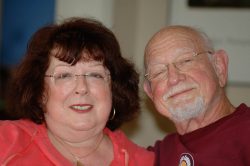
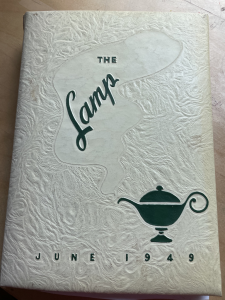
##
My Books
When my son was 2.5 years-old I wrote a little poem and envisioned it as a picture book illustrated specifically with highly saturated watercolors. 24 years later I released Everything Changes Including Me and have been writing and illustrating children’s books ever since. They are available in soft and hardcover from Amazon and you can download them electronically wherever you get your digital books. Thanks for reading and please leave
a five star ☆☆☆☆☆ rating
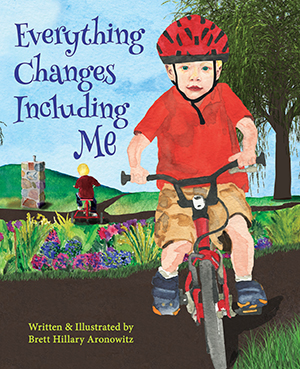
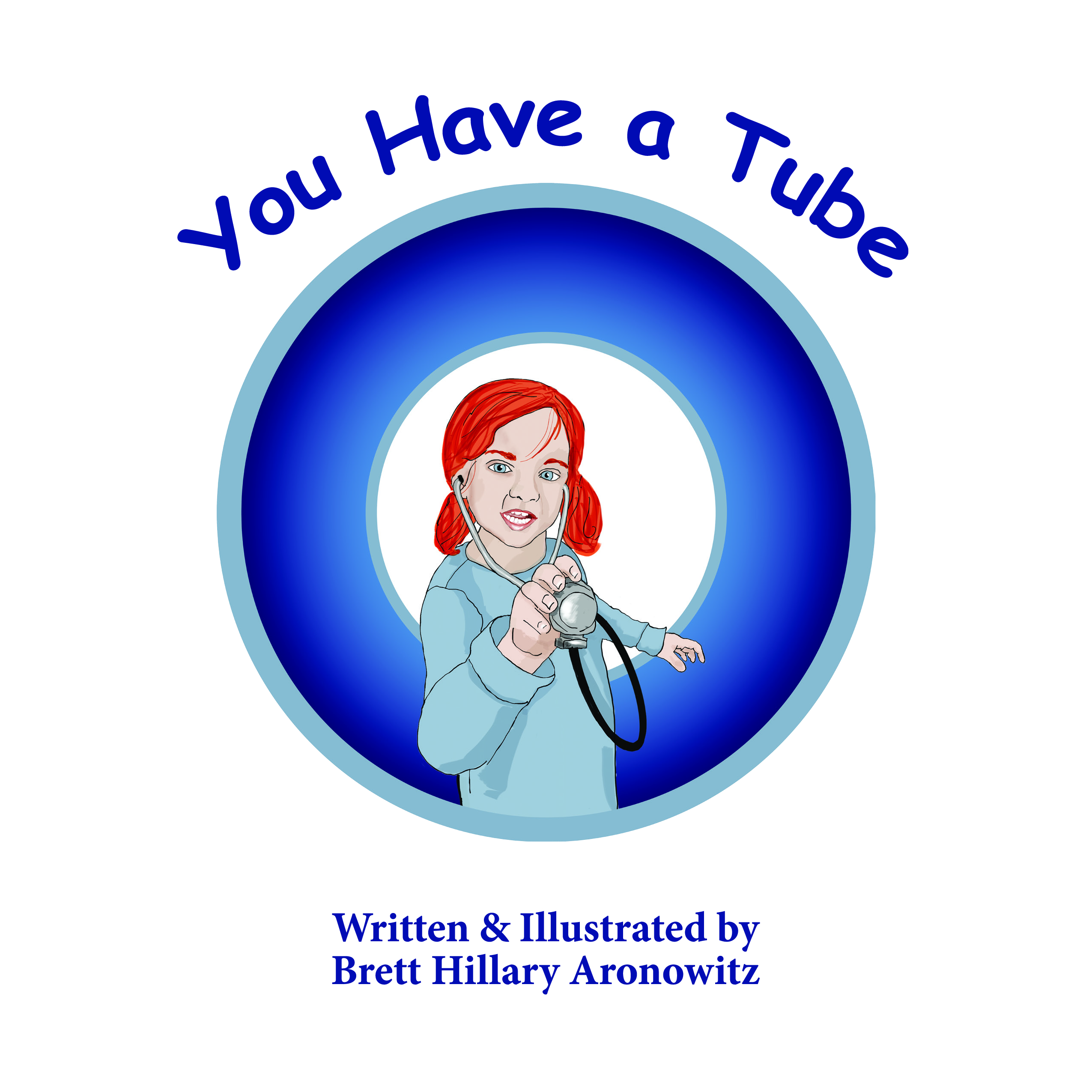

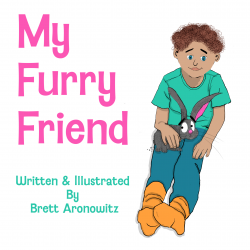
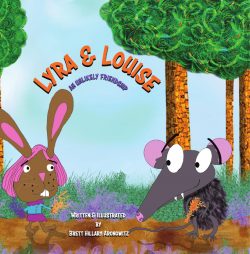
“Brett Aronowitz did a great job creating business cards for my upcoming book! I had a simple type thing in mind and asked if she could lay it out for me. WOW did she deliver! Her knowledge of printing helped give me a full color card for a price that was affordable. She turned the idea on its side and put a full color image on it which pleased me so much and turned out great. Her printer provided a fast delivery and the color processing and card stock are high quality. A great value overall was received. I recommend her design and production services highly.”
